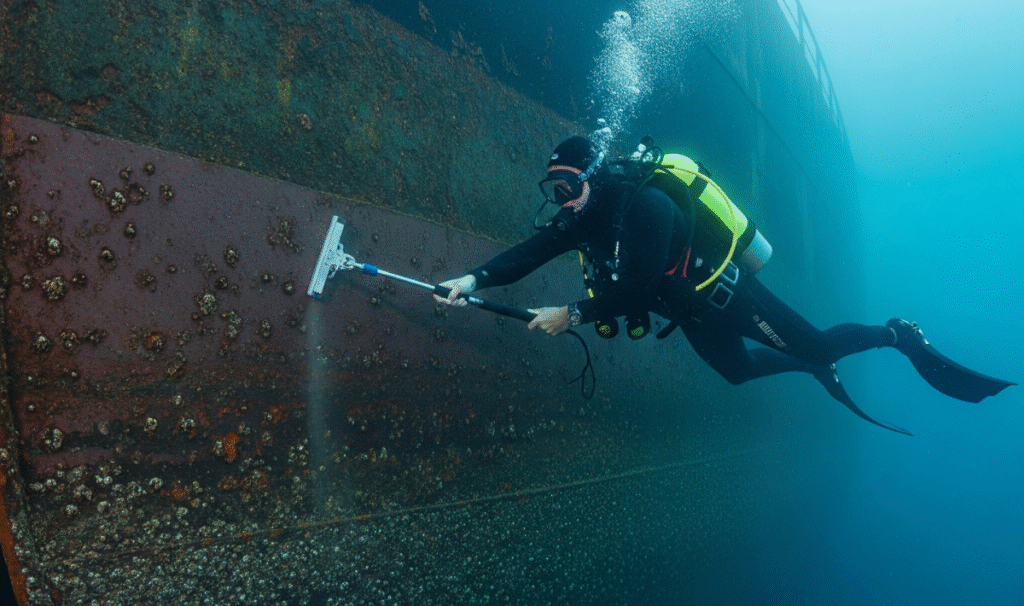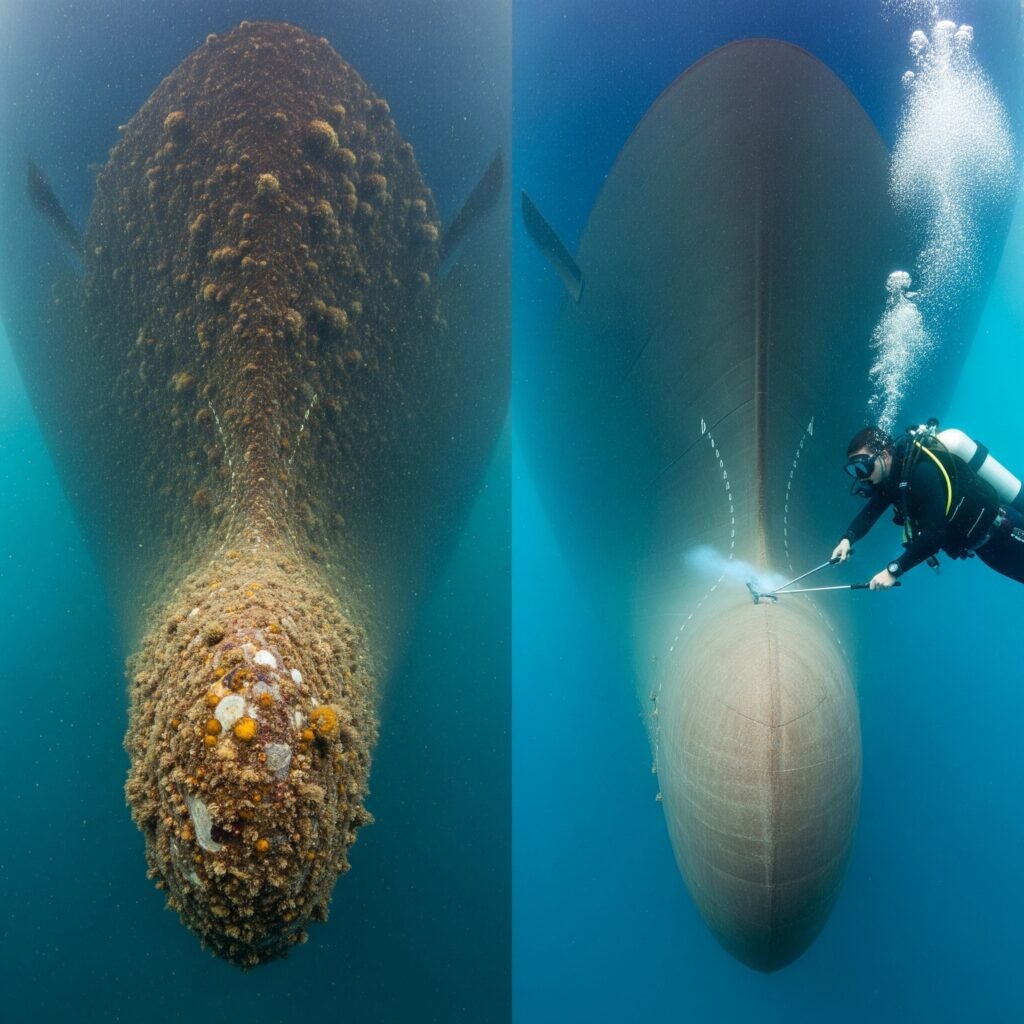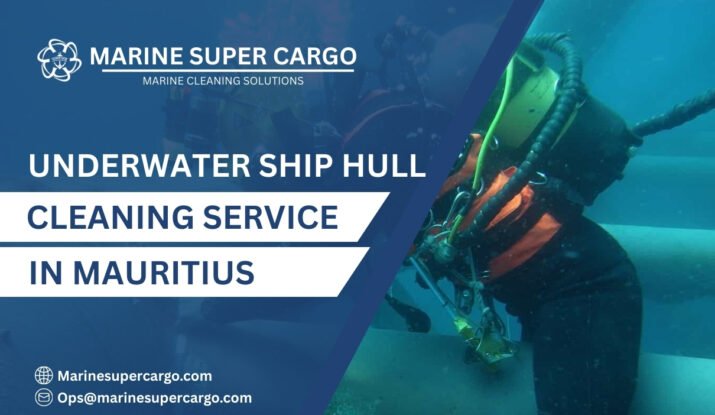Imagine Mauritius—not just as a tropical paradise with turquoise lagoons and white-sand beaches—but as a busy gateway for international shipping. Positioned strategically in the Indian Ocean, Mauritius bridges the trade routes that connect Asia, Africa, and Europe. Every year, vessels of all shapes and sizes dock here for refueling, maintenance, and repairs. That’s where underwater ship hull cleaning in Mauritius comes into play.
It may sound like a simple chore—scraping off barnacles and algae—but in reality, it’s a vital service that impacts fuel consumption, ship safety, and even global sustainability goals. Let’s dive deep (pun intended!) into the underwater ship hull cleaning in Mauritius, and why it matters for your vessel and the planet.
What is Underwater Ship Hull Cleaning Mauritius?
At its core, hull cleaning means removing marine growth—like barnacles, seaweed, and slime—that latch onto a vessel’s underwater surfaces. This unwanted buildup, known as biofouling, increases drag, slows the ship, and forces engines to burn more fuel.
Underwater cleaning involves divers or specialized robots using brushes, scrapers, and water jets to restore the hull to a smooth, efficient condition. In Mauritius, thanks to clear waters and skilled marine professionals, the process is not only effective but also eco-conscious.

How Marine Biofouling Increases Fuel Use
Think of your ship as an athlete: when it’s streamlined, it glides with ease. But add a weighted vest—in this case, barnacles and slimy buildup—and performance drops. Research shows that heavy fouling can increase fuel consumption by up to 40%. That’s a massive cost for ship operators.
The Science Behind Smooth Hulls and Speed
A clean hull reduces resistance and allows your vessel to move faster with less energy. In Mauritius, where hull cleaning services are readily available, shipowners enjoy reduced fuel bills and shorter turnaround times at port. That’s money saved straight into your pocket.
And here’s the kicker: ships that undergo underwater ship hull cleaning in Mauritius on a regular schedule often see cost reductions that outweigh the cleaning expense itself.
Preventing Structural Damage
When marine growth attaches itself to hulls for too long, it traps moisture against the surface. Over time, this accelerates corrosion and weakens the hull structure. Regular cleaning helps prevent long-term damage, keeping vessels seaworthy for decades instead of just years.
Ensuring Compliance with Maritime Safety Standards
Global shipping is tightly regulated under frameworks like IMO (International Maritime Organization) and MARPOL. Hull inspections are crucial for safety. By scheduling professional underwater ship hull cleaning in Mauritius, you’re not just protecting your ship—you’re also making sure it passes rigorous inspections without surprise failures.
Reducing Greenhouse Gas Emissions
Did you know the shipping industry contributes about 3% of global greenhouse gas emissions? According to imo.org, reducing drag through underwater ship hull cleaning in Mauritius is a powerful way to minimize CO₂ output. Every ton of fuel saved means fewer emissions released into our atmosphere.
Preventing Invasive Marine Species Spread
The MARPOL convention emphasizes the importance of preventing invasive species from hitching rides across oceans. Algae or organisms attached to one hull in Asia could spread to Mauritius if not cleaned. By tackling this, we protect the stunning biodiversity of Mauritian waters and comply with international environmental laws.
Strategic Position in Global Shipping Routes
Mauritius isn’t just a holiday destination—it’s also a pit stop for vessels traversing the East-West trade highway. Ships naturally pass through, making it convenient to get maintenance work, such as underwater ship hull cleaning in Mauritius, done without detours.
Skilled Divers and Modern Marine Facilities
Local divers are trained to international standards upheld by imca-int.com. Using modern cleaning tools and eco-friendly procedures, these professionals ensure ships receive world-class service without harming local ecosystems.
Insights from IMO and MARPOL Convention
The IMO sets global standards to minimize shipping’s environmental footprint. MARPOL pushes vessels to reduce waste, emissions, and biofouling risks. Underwater ship hull cleaning in Mauritius plays a central role in meeting these requirements.
Best Practices Promoted by IMCA and IAPH
Both IMCA and IAPH stress the need for responsible underwater maintenance and the adoption of new technologies. Mauritius is embracing these best practices, aligning itself with the world’s top maritime hubs.
Step-by-Step Overview
- Inspection – Divers or robotic systems first assess the hull’s condition.
- Cleaning – Using brushes, scrapers, or cavitation devices, biofouling is removed.
- Rinse and Polish – A smooth hull finish is restored.
- Final Check – Quality control ensures compliance with environmental and safety standards.
Tools and Techniques Used
From cutting-edge ROVs (remotely operated vehicles) to eco-friendly scrubbers, the process has evolved significantly. In Mauritius, techniques are chosen carefully to balance efficiency with environmental protection.
Weather and Environmental Conditions in Mauritius
Tropical waters make cleaning easier than in colder regions, but seasonal cyclones can delay underwater operations. Planning maintenance during calmer months ensures smooth scheduling.
Balancing Cleaning Frequency and Cost
Too frequent cleanings can wear down protective coatings; too infrequent, and biofouling gets out of control. Experts in Mauritius advise creating a tailor-made schedule for your vessel to optimize both costs and efficiency.
Emerging Eco-Friendly Technologies
Expect greener innovations like biocide-free paints and hull-cleaning drones. Advanced coatings already slow biofouling, meaning ships in Mauritius will require less intensive cleaning over time.

Digital Monitoring and AI in Marine Maintenance for Underwater Ship Hull Cleaning in Mauritius
Artificial intelligence is the next frontier. Soon, sensors and AI systems will monitor hull conditions in real-time, scheduling precise underwater cleanings in Mauritius only when required—saving both money and marine life.
Conclusion
When you look beneath the surface, ships tell a story. Neglect biofouling, and you’ll pay more for fuel, risk safety, and harm the oceans. But embrace proper maintenance, and you unlock a wealth of benefits.
In short, the underwater ship hull cleaning in Mauritius is:
- Saving fuel and cutting operating costs.
- Strengthening safety and vessel longevity.
- Protecting the environment and marine ecosystems.
Mauritius isn’t just a beautiful island—it’s a smart destination for vessel care. By prioritizing underwater ship hull cleaning in Mauritius, you’re not just maintaining a ship, but also sailing toward a more sustainable future.
FAQ:
Q1. How often should I schedule underwater ship hull cleaning in Mauritius?
Typically, every 6–12 months, depending on vessel activity and operating waters. Tropical waters may require slightly more frequent cleaning.
Q2. Is hull cleaning in Mauritius environmentally safe?
Yes, when performed by certified professionals who follow IMO and IMCA-approved guidelines. They use eco-friendly tools and methods to minimize harm.
Q3. Does underwater cleaning affect my ship’s coating?
If done correctly, it doesn’t damage protective coatings. The key is hiring trained divers who know when to scrub lightly and when deeper cleaning is necessary.
Q4. How does hull cleaning reduce fuel costs?
By lowering the drag caused by biofouling, the ship glides more smoothly through water, which directly cuts fuel consumption.
Q5. Why choose Mauritius over other ports?
Mauritius offers skilled divers, a strategic location on global shipping routes, and compliance with international maritime standards—making it cost-effective and convenient.


